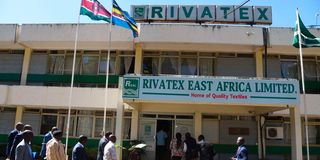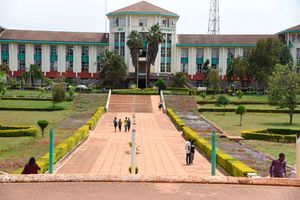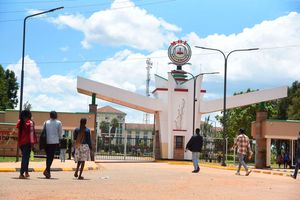
Rivatex East Africa Limited in Eldoret City in this picture taken on January 13, 2023.
The restructuring of Eldoret-based textile manufacturer Rivatex and the onboarding of a strategic non-equity partner to revitalise the struggling company will take longer than expected due to financial and economic constraints.
The proposed 21-year lease of the textile mill, aimed at reviving the country’s textile and cotton industry, is yet to attract suitable bidders despite Cabinet approval for its privatisation and significant investment by the government and development partners.
According to Rivatex Managing Director Stanley Bett, valuation and legal frameworks are in place and public participation is ongoing to fast-track the partnership process.
“The process to lease the facility to a strategic partner who will inject working and operational capital is ongoing, but we are yet to receive a suitable bidder to revitalise the firm,” he explained.
Mr Bett said that some investors from Benin have expressed interest in taking over operations of the firm and providing both working capital and technical support to modernise the company. “It is investors from Benin who have so far expressed interest as a strategic partner. Discussions are ongoing alongside public participation to fast-track the entire process,” he added.
The textile firm, acquired by Moi University for Sh205 million in 2007, has faced ongoing financial and operational challenges due to high energy costs, inadequate raw materials and inefficient production processes, resulting in continued heavy losses. As of the financial year ending June 2023, the company reported a loss of Sh347.6 million bringing its cumulative loss to over Sh3 billion.
“The strategic investors will inject capital, expertise and operational support to modernise the facility and boost cotton production in the country,” said Mr Bett.
He noted that the firm has increased its spinning capacity to process 12,000 kilograms of yarn daily producing 70,000 meters of finished fabric, up from 40,000 meters.
“We are currently experiencing a steady supply of raw materials, which has enabled us to increase processing capacity and generate profit, making the company more self-sustaining,” he said.
Rivatex which used to produce 15.73 million metres of fabric annually before being placed under receivership in 2000 due to administrative and financial mismanagement has implemented cost-cutting measures as part of its restructuring to meet international market demand.
The company has recycled 32,800 kilogrammes of fibre waste worth Sh9.8 million over the last three years to produce yarn for school uniform production.
“Currently, we import polyester directly from manufacturers rather than purchasing locally from resellers, resulting in savings of Sh2.5 million per forty-foot container,” Mr Bett explained.
He appealed to the government to support the company by allocating additional working capital to procure critical raw materials, increase production capacity, achieve profitability and expand into the export market.







